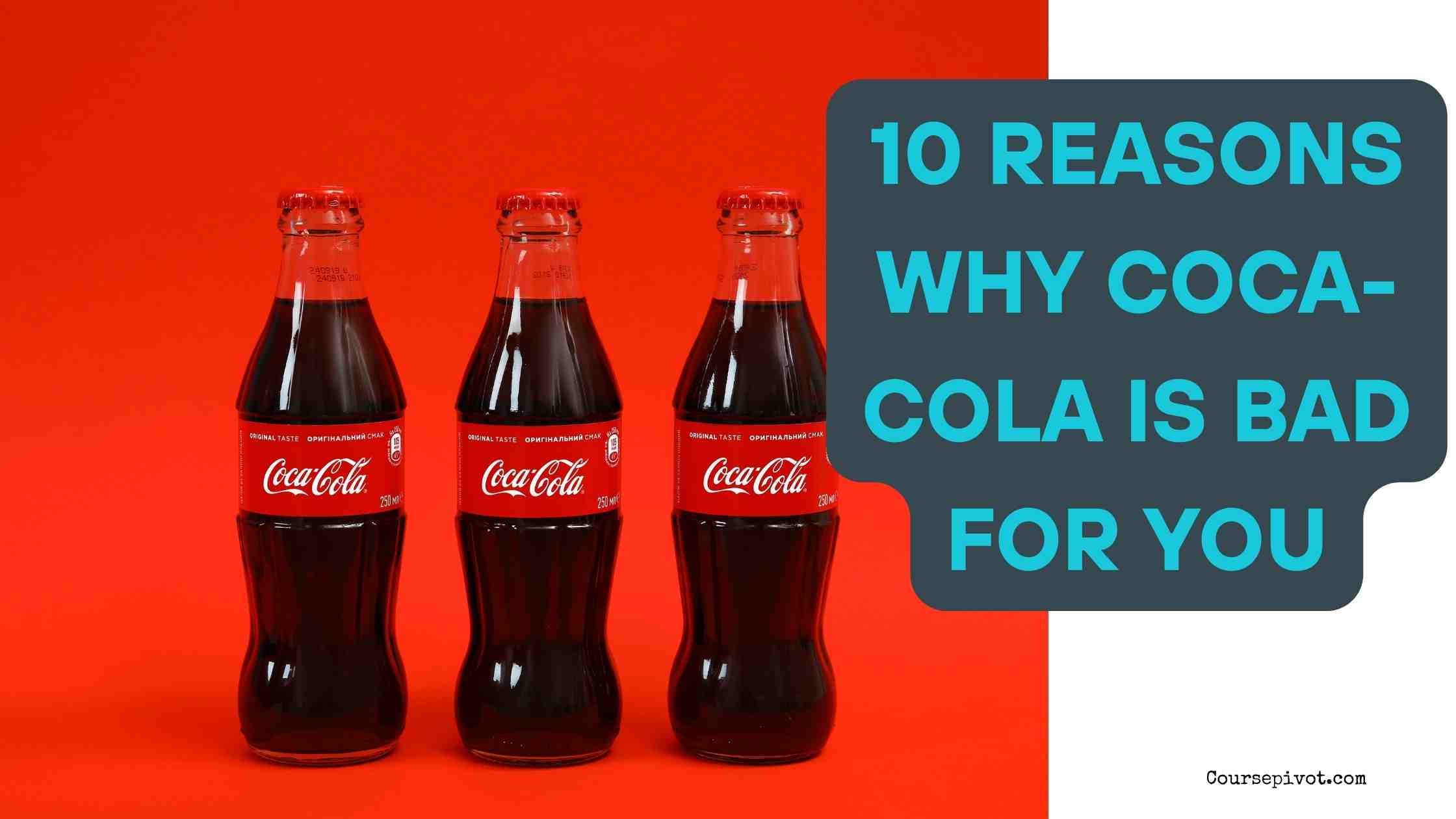
10 Reasons Why Coca-Cola Is Bad for You
Coca-Cola may be one of the most iconic drinks in the world, but just because it’s popular doesn’t mean it’s healthy.
I’ll admit it—there was a time when I couldn’t go a day without a cold can of Coke. It tasted good, gave me energy, and felt harmless.
But the truth hit me hard once I started learning what’s actually in it and how it affects the body.
Table of Contents
Is CocaCola bad for you? Let’s be real—it can be.
Below are 10 compelling reasons why Coca-Cola is bad for you, and why cutting back or quitting might be one of the best decisions for your health.
1. High Sugar Content Leads to Weight Gain
Did you know a single can of Coca-Cola contains about 39 grams of sugar?
That’s more than your entire daily recommended intake.
Consuming that much sugar spikes your blood glucose, which then crashes—making you feel sluggish and crave even more sugar.
Over time, this can lead to obesity, especially if you’re drinking it daily without burning off the calories.
2. It Increases Risk of Type 2 Diabetes
Sugar isn’t just about weight—it affects your entire system.
Consistently drinking sugary beverages like Coca-Cola can increase insulin resistance, a key risk factor for type 2 diabetes.
Studies show that people who drink sugary sodas regularly are 26% more likely to develop diabetes. That’s a number worth taking seriously.
- Read our blog on 5 Reasons Why You Should Never Eat Tilapia
3. Coca-Cola Damages Your Teeth
Ever noticed how your teeth feel sticky or rough after drinking Coke?
That’s not your imagination.
Coca-Cola is acidic (with a pH around 2.5) and loaded with sugar—a double threat to your dental health.
It erodes enamel and feeds bacteria that cause cavities. Dentists can always tell when someone drinks soda often.
4. It’s Linked to Fatty Liver Disease
Most of us associate liver problems with alcohol—but sugar is a hidden culprit.
Coca-Cola is made with high-fructose corn syrup, which the liver processes.
Too much of it leads to fat buildup in the liver, even in people who don’t drink alcohol.
Over time, this can result in non-alcoholic fatty liver disease (NAFLD)—a silent but serious condition.
5. It Contains Empty Calories
Coca-Cola may give you energy, but it’s nutritionally empty.
No fiber. No protein. No vitamins. No minerals. Just sugar, caffeine, and flavoring.
It fills your stomach but does nothing for your body.
Even worse, it can suppress your appetite for real food—meaning you get less nutrition while still gaining weight.
6. Caffeine Dependency and Sleep Disruption
Many people forget that Coca-Cola contains caffeine—about 34 mg in a 12-oz can.
While that might give you a quick jolt of energy, it can also:
- Disrupt your sleep
- Make you jittery or anxious
- Create caffeine dependence, especially when consumed daily
If you ever feel like you need a Coke to function, that’s a sign of dependency.
7. It Can Harm Your Heart Health
The sugar and sodium in Coca-Cola contribute to high blood pressure, inflammation, and cholesterol issues.
Research shows a clear link between sugary drinks and increased risk of heart disease.
Your heart is one of the most sensitive organs to diet. Drinking Coke regularly? You’re putting it at risk.
8. Contributes to Metabolic Syndrome
Metabolic syndrome is a group of conditions—high blood pressure, belly fat, high blood sugar, and abnormal cholesterol—that raise your risk of stroke, heart disease, and diabetes.
Regular consumption of Coca-Cola can throw your entire system out of balance, putting you on the path toward this dangerous condition.
9. It Can Affect Mental Health
Too much sugar has been linked to mood swings, anxiety, and even depression.
While Coke may feel like a treat in the moment, the sugar crash can leave you irritable, fatigued, and foggy.
There’s also growing research connecting diet and mental clarity, and Coca-Cola doesn’t do your brain any favors.
10. You’re More Likely to Develop Cravings
Here’s the tricky part: Coca-Cola isn’t just something you enjoy—it’s engineered to be addictive.
Between the sugar, caffeine, and flavor enhancers, your brain gets used to that spike of pleasure.
Before you know it, you’re reaching for another. And another.
That kind of craving cycle can be hard to break—and it often leads to overeating and poor health choices.
Is Coca-Cola Bad for You?
So, is Coca-Cola bad for you?
In small doses? Maybe not life-threatening.
But over time, with regular consumption, Coke can quietly damage your health in multiple ways.
It messes with your weight, your liver, your teeth, your heart, and even your mood.
And the worst part? Most people don’t realize it until they’ve developed habits that are hard to reverse.
If you enjoy it, consider saving it for a rare treat—not a daily drink.
Your body—and mind—will thank you for cutting back.
Cite this article
You can copy and paste your preferred citation format below.
Martin, L. & Arquette, E.. (2025, May 22). 10 Reasons Why Coca-Cola Is Bad for You. Coursepivot.com. https://coursepivot.com/blog/10-reasons-why-coca-cola-is-bad-for-you/



